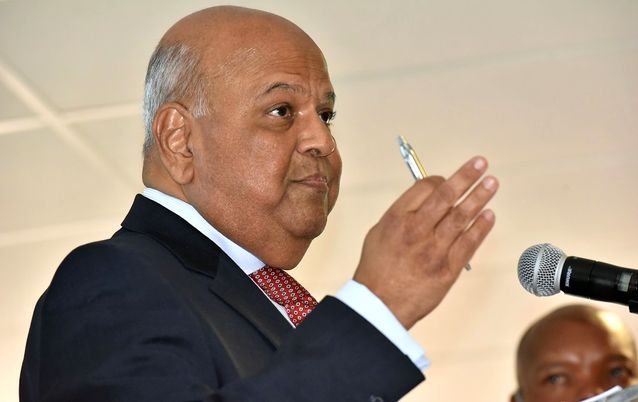AFTER every budget, the Treasury goes on a road show to tell its story to investors. This time, Finance Minister Pravin Gordhan and his officials took some 30 business and trade union leaders to London, Boston and New York to investors who hold more than R600bn of SA’s government bonds. Rating agencies were also on the itinerary.
It’s a heroic effort by the minister to stave off a downgrade of SA’s ratings to junk status and rebuild the credibility that was so badly damaged by the firing of Nhlanhla Nene in December.
The question is whether the charm offensive will succeed, and for how long, in the absence of action to back it up.
Importantly, the collaborative effort by the government, business and labour will have sent a strong signal and investors will no doubt have taken note.
Labour’s participation indicated a willingness to tackle the unstable labour environment that has been one of the constraints on SA’s growth. Business’s participation shows a willingness to invest and support the government in its growth efforts. That may have had an effect.
But Mr Gordhan and his Team SA didn’t have an easy time. Investors and rating agencies asked the obvious questions about the risks to Mr Gordhan’s carefully crafted fiscal framework; whether the government was really committed to fiscal prudence; and whether it was willing or able to implement reforms that would boost economic growth.
They asked the obvious political questions too — about state-owned enterprises governance and financial stability, and about the allegations of "state capture" by businesses, and corruption.
Most of all, the response was that concrete action, rather than yet more policies and pronouncements, was what was required. Mr Gordhan was attuned to this. "We need to be aware as South Africans that we need to provide concrete evidence in the next few months that we are not just talking," he said on Monday.
He summarised the initiatives that business and the government are working on together in an effort to avert a downgrade and boost the growth rate. They include small and medium enterprises and supporting sectors such as agriculture and tourism that can create jobs. There are some powerful CEOs working on these and clear milestones have been set. Business has done much too to try to make it clear to the government what needs to be fixed in terms of regulatory uncertainty and red tape to remove constraints to entrepreneurship, investment and growth.
But do Mr Gordhan’s colleagues in the government understand the urgency? President Jacob Zuma has said all the right things and has had some high-profile and stage-managed interactions with business leaders and investors. But has he done anything that would underpin Mr Gordhan’s position or sent a clear message to investors that the finance minister and Team SA have the support to do what needs to be done to tackle the concerns?
That is not clear. As long as Mr Zuma leaves the dispute between Mr Gordhan and South African Revenue Service Commissioner Tom Moyane unresolved, there will be questions about the finance minister’s authority and the distractions he has to endure.
Whether or not he allows Mr Gordhan to remove South African Airways chairperson Dudu Myeni will be another test of Mr Zuma’s ability to do the right thing.
The right action on just those two issues would send a signal that would probably be strong enough to buy SA some meaningful time.
The road show revealed clearly that the credibility and respect earned by the finance minister, the Treasury and the Reserve Bank over the years is one of SA’s crucial assets saving us from a downgrade.
Mr Zuma and the rest of his Cabinet need to understand this clearly.

Finance Minister Pravin Gordhan addresses a business conference in Johannesburg last week. Picture: BUSINESS DAY
AFTER every budget, the Treasury goes on a road show to tell its story to investors. This time, Finance Minister Pravin Gordhan and his officials took some 30 business and trade union leaders to London, Boston and New York to investors who hold more than R600bn of SA’s government bonds. Rating agencies were also on the itinerary.
It’s a heroic effort by the minister to stave off a downgrade of SA’s ratings to junk status and rebuild the credibility that was so badly damaged by the firing of Nhlanhla Nene in December.
The question is whether the charm offensive will succeed, and for how long, in the absence of action to back it up.
Importantly, the collaborative effort by the government, business and labour will have sent a strong signal and investors will no doubt have taken note.
Labour’s participation indicated a willingness to tackle the unstable labour environment that has been one of the constraints on SA’s growth. Business’s participation shows a willingness to invest and support the government in its growth efforts. That may have had an effect.
But Mr Gordhan and his Team SA didn’t have an easy time. Investors and rating agencies asked the obvious questions about the risks to Mr Gordhan’s carefully crafted fiscal framework; whether the government was really committed to fiscal prudence; and whether it was willing or able to implement reforms that would boost economic growth.
They asked the obvious political questions too — about state-owned enterprises governance and financial stability, and about the allegations of "state capture" by businesses, and corruption.
Most of all, the response was that concrete action, rather than yet more policies and pronouncements, was what was required. Mr Gordhan was attuned to this. "We need to be aware as South Africans that we need to provide concrete evidence in the next few months that we are not just talking," he said on Monday.
He summarised the initiatives that business and the government are working on together in an effort to avert a downgrade and boost the growth rate. They include small and medium enterprises and supporting sectors such as agriculture and tourism that can create jobs. There are some powerful CEOs working on these and clear milestones have been set. Business has done much too to try to make it clear to the government what needs to be fixed in terms of regulatory uncertainty and red tape to remove constraints to entrepreneurship, investment and growth.
But do Mr Gordhan’s colleagues in the government understand the urgency? President Jacob Zuma has said all the right things and has had some high-profile and stage-managed interactions with business leaders and investors. But has he done anything that would underpin Mr Gordhan’s position or sent a clear message to investors that the finance minister and Team SA have the support to do what needs to be done to tackle the concerns?
That is not clear. As long as Mr Zuma leaves the dispute between Mr Gordhan and South African Revenue Service Commissioner Tom Moyane unresolved, there will be questions about the finance minister’s authority and the distractions he has to endure.
Whether or not he allows Mr Gordhan to remove South African Airways chairperson Dudu Myeni will be another test of Mr Zuma’s ability to do the right thing.
The right action on just those two issues would send a signal that would probably be strong enough to buy SA some meaningful time.
The road show revealed clearly that the credibility and respect earned by the finance minister, the Treasury and the Reserve Bank over the years is one of SA’s crucial assets saving us from a downgrade.
Mr Zuma and the rest of his Cabinet need to understand this clearly.





















Change: 0.83%
Change: 0.93%
Change: 0.95%
Change: 0.73%
Change: 1.91%
Data supplied by Profile Data
Change: 0.58%
Change: 0.43%
Change: 0.83%
Change: 0.00%
Change: 0.56%
Data supplied by Profile Data
Change: -1.67%
Change: -0.90%
Change: -0.65%
Change: -1.21%
Change: -0.47%
Data supplied by Profile Data
Change: 2.49%
Change: 2.09%
Change: 2.30%
Change: 2.29%
Change: 3.39%
Data supplied by Profile Data